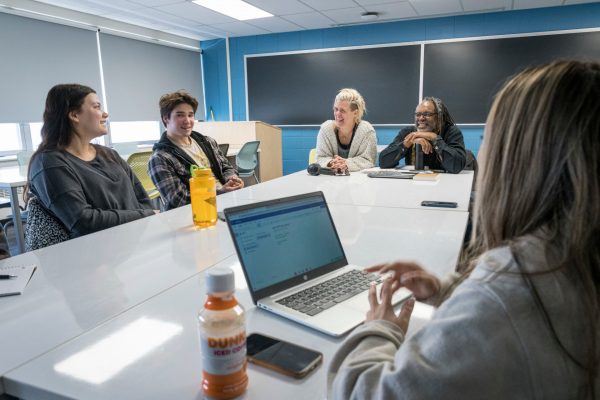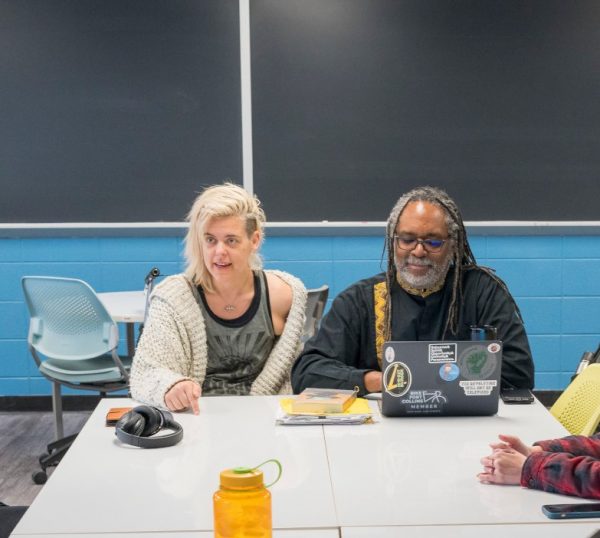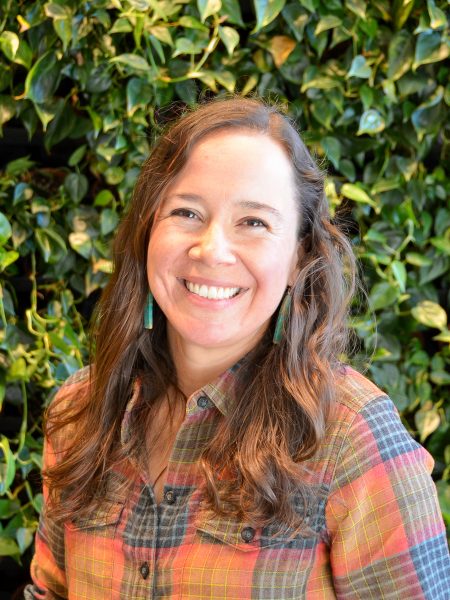
In the Indigenous American teen comedy Reservations Dogs, we follow the lives and misadventures of four friends in rural Oklahoma who dream of leaving their home behind and moving to California. Before the show’s first season finale aired, actor and filmmaker Devery Jacobs responded to a question posed by the online magazine them about how working in the genre had informed her own sense of identity. Jacobs answered: “My mom always said, ‘Well if you don’t laugh, you’re going to cry. So, you might as well laugh it off.’” Jacobs continued, “There’s such an element of Indigenous and queer humor that is funny and teasing, but it’s also a little bit biting because there’s a painful truth in there.”
This duality of humor is on full display in an interdisciplinary seminar hosted in the College of Liberal Arts. A new course designed and team-taught by Associate Professor of Ethnic Studies Dr. Ray Black and Senior Instructor of English sarah louise pieplow (slp), asks students to examine how narratives and histories of comedy challenge systems of power and oppression.
In the course, titled, Satire and Irony as Protest: Comedy in the Face of Systemic Prejudice, Black and slp encourage their students to be activists in the classroom and engage in critical thinking that considers their own positionality to larger cultural groups and systemic issues. Specifically, the course is focused on humor crafted by artists, writers, and creators who hold Black, Jewish, Native, and queer identities, as well as folks who identity as having a disability.
“In terms of an ethnic studies framework, we’re educating our students about these communities, but also learning from the communities and advocating for the communities,” Black says.
By examining how irony works in a 19th century slave narrative to analyzing the use of trickster characters in Reservations Dogs and looking at the history of camp through Angels in America, the course provides students with a base of learning for future practice. As Black notes, “We want them to know, historically, what they’re protesting and why they’re protesting, so they can better respond to what’s happening in the world now and lead those conversations.”
Structured as a seminar-style class on Tuesdays and a workshop on Thursdays, the course prioritizes collaboration and self-reflection. “We’re very much focused on helping students access and assess their own individual journeys and transformations, using these various texts and genres to get us there,” slp says.
Black also emphasizes creating an environment that acts as a brave space.
“When students are open, things might hurt or be revealed that don’t always feel good,” Black says. “But in a brave space, we come together and acknowledge and accept each other.”

As instructors from different personal and academic backgrounds, slp notes that sharing their own perspectives and considering content that speaks to a wide breadth of identities has only benefited the classroom dynamics and discussions. “I think that was really one of the selling points of the class and how we got it off the ground,” slp says. “The course is best served by having people of different levels of experience and aspects of identity facilitating these conversations alongside students.”
Another benefit to the team-taught structure is the opportunity for Black and slp to model strong allyship for their students.
“Since we share the same ethics and goals, we get to show students what it looks like to laugh at each other and disagree,” slp says. “Sometimes we define things differently, and go back and forth—and as result, our friendship has become valuable as a teaching moment.”
Black adds, “One of the reasons we can be strong allies is because even though we have differentiated experiences, we're never trying to use those experiences to erase the other person's experience.”
In this way, the course is especially reflective of its title. Not only does the content illuminate how laughter enacts protest, but its very structure allows for nuanced, innovative approaches to education.
Another tool of resistance: Collaborative student-made art
Queer Indigenous Studies, a recent course offered by the Department of Ethnic Studies as part of the Indigenous Studies Minor, invites students to disrupt their previously held perceptions of queerness, Native studies, and how resistance shows up in our daily lives.
Taught by Assistant Professor Dr. Lindsey Schneider, the course aims to re-orient students’ understanding of what queerness is and can be. “Queerness is more than just an identity that we claim—it’s inherently political and has dimensions that go beyond identity and the self,” Schneider says.
“In this course we aren’t looking at queer Native people as objects of study. We’re flipping that lens and thinking about the epistemological tools and philosophical insights that Native people have, and how we can use those to look out into the world and ask, Why is it like this? And how could things be different?”
Rather than viewing queer Indigenous studies through a lens that hopes to recapture something colonialism erased, the course is interested in creation and cultural production as modes of protest. For Schneider, who is teaching the course in-person for the first time this spring, it’s been especially exciting to see students recognize this shift.
“When we move away from the pre-colonial tradition or that kind of recovery aesthetic, we get to see Indigenous people coming up with new ways of what it means to be queer and what that looks like. Being inspired by just the power of creation in Indigenous communities and in queer Indigenous spaces, I think sparks a kind of creativity in the students,” Schneider says.

Being inspired by just the power of creation in Indigenous communities and in queer Indigenous spaces, I think sparks a kind of creativity in the students." — Lindsey Schneider
For their final project, students collaborate in groups of four or five to craft their own zine. By engaging the concepts they’ve learned creatively and collectively, Schneider wants students to consider how to practice resistance outside of class.
“The zine is such a queer art form,” Schneider says, “and so having them work together to connect to the practice is a useful way for them to think about protest as a collective endeavor. It’s not something we do as individuals. It’s a collective process that we’re all responsible for.”
In this way, Schneider reveals how art harnesses its own force of resilience. Beyond participating in social movements, or attending marches and making signs, Schneider says she hopes to expose her students to the many layers of protest—which includes avoiding burnout and finding “a survivable way to make it part of one’s daily life.”
To learn more about the Department of Ethnic Studies and its undergraduate programs, visit the department's website.
